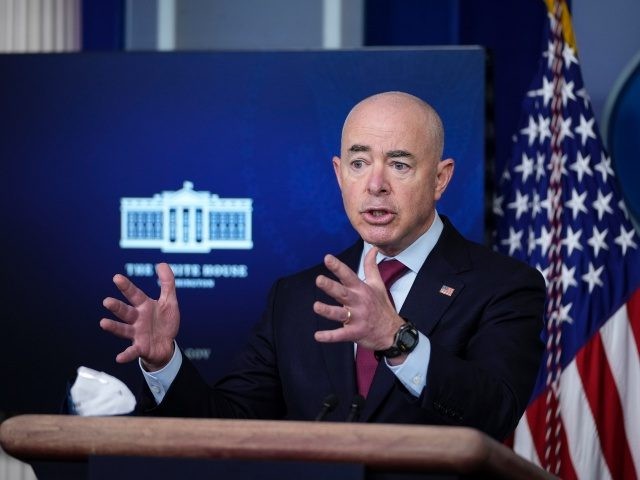
Joe Biden’s deputies are admitting another 22,000 foreign workers to help U.S. businesses, regardless of the damage done to working Americans and their communities now recovering from the coronavirus crash.
“Today’s joint rule helps American businesses,” said a statement from Alejandro Mayorkas, the pro-migration lawyer who is now secretary of the Department of Homeland Security (DHS).
The joint rule with the Department of Labor will also help the economies of Central American countries, Mayorkas added:
For the first time, we are setting aside [6,000] supplemental [H-2B] visas for noncitizens from Northern Triangle countries, in furtherance of President Biden’s and Vice President [Kamala] Harris’ direction to expand legal pathways for protection and opportunity for individuals from those countries.
The “rule is designed to prevent permanent and severe financial loss to U.S. employers … and is one piece of the administration’s broader comprehensive framework for managing migration throughout North and Central America,” echoed Mayorkas’ deputy, Tracy Renaud, who is the acting director of the U.S. Citizenship and Immigration Services agency.
Mayorkas and his university-trained deputies did not explain how the inflow of foreign workers would help blue-collar Americans, even as the extra visas give U.S. progressives another lever to manage migration for their own benefit.
Like many other progressives, Mayorkas has repeatedly insisted the United States is a nation of immigrants. He also argues that immigrant-owned businesses are the “backbone of our … country” and that his “highest priority” is to transfer lawfully deported migrants to join family members in the United States.
Every year, the federal government breaks open the U.S. national labor market to allow U.S. employers to hire more than a million workers via the H-1B, H-2A, H-2B, L-1, J-1, TN, B1/B2, OPT, E-3, CPT, and other visa programs. The imported workers are not immigrants — but many work long hours at low wages in the hope of getting the hugely valuable prize of green cards from benevolent employers.
The H-2B program admits 66,000 workers per year. But each worker can stay for up to three years, perhaps creating a hidden workforce of 150,000 H-2B workers.
The annual inflow of visa workers keeps an ever-changing population of roughly 2 million white-collar and blue-collar workers in the United States. That population provides one foreign worker for every two Americans who enter the workforce each year.
The visa workers transmit much of their payroll back to their home countries, so reducing local sales for American retailers and their employers and also cutting tax receipts by local governments. The extra workers also deter companies from investing in labor-saving, wealth-generating machines.
Progressive-backed Wall Street investors use this flood of cheaper workers to wash away working-age Americans’ ability to leverage higher wages from their employers in their own national labor market.
Most of the foreign workers are used to fill the white-collar jobs indebted U.S. graduates need. Roughly one-quarter are blue-collar jobs in agriculture, manual labor, and the service sector.
Former President George W. Bush recently described his tree-farming business:
It’s not a very profitable business I want you to know, but it works because there are eight H-2B visa holders who come up [from Mexico] and work for us.
They’re skilled, big family people, they send their money home to their families, but [the H-2B visa program requires] they have to go home every year for two months. Then there’s a question as to whether or not the government let him back in after the two-year hiatus. That creates enormous uncertainty and if at some point, the government says “You can’t come back in,” then all of a sudden, we got a real problem.
“There’s nothing free about a market that props up bad business models with gifts of cheap foreign labor,” responded Rob Law, the director of regulatory affairs and policy for the Center for Immigration Studies, told Breitbart News.
In contrast, former President Donald Trump’s administration gradually set partial curbs on the inflow of white-collar and blue-collar workers, so helping to push up wags in Trump’s go-go economy.
But Biden’s government is dismantling those curbs because it is eager to help companies import workers, legally and illegally.
For example, the Mayorkas rule allows H-12B workers to switch employers. This serves as a partial remedy for abuse by employers, but it also allows U.S. employers to hire foreign workers from the resident pool of H-12B workers instead of from unemployed Americans.
Breitbart News reported in April:
Roughly 6.9 million Americans are out of the labor force entirely, but all want full-time employment. Another 5.8 million Americans are underemployed, working part-time jobs but wanting full-time employment.
In the fields in which working class Americans are forced to compete with foreign H-2B visa workers, unemployment rates remain high:
Construction unemployment rate: 8.6 percent
Hospitality industry unemployment rate: 19.9 percent
Restaurant industry unemployment rate: 11.8 percent
Food processing unemployment rate: 7.9 percent
Yet, the progressives who run DHS are also reluctant to give up their power over companies. For example, the Mayorkas rule requires U.S. employers who want the extra H-2B workers to advertise their jobs online and contact laid-off workers. The rule also promises 500 audits of U.S. employers.
The H-2B program is used by many employers who are on the low end of the U.S. labor market — landscapers, seasonal hotels, fish processors, for example. These employers are forced to hire Americans who could not get better jobs or permanent jobs, perhaps because of prison records, or tardiness, or combativeness towards employers.
This means that many employers prefer H-2B workers who tend to be easy to manage, diligent, and hard-working, partially because the dollars they earn are very valuable in their low-cost home countries.
But critics of the H-2B program say it makes it more difficult for lower-quality U.S. workers to get the training, habits, and experience they need to become better and high-paid workers.

No comments:
Post a Comment